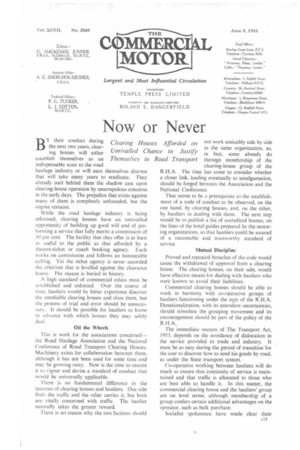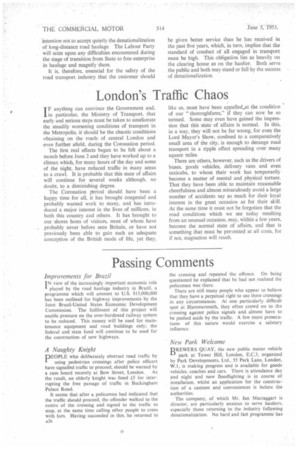Now or Never
Page 27

Page 28

If you've noticed an error in this article please click here to report it so we can fix it.
BY their conduct during the next two years, clear ing houses will either establish themselves as an indispensable asset to the road haulage industry or will earn themselves distrust that will take many years to eradicate. They already trail behind them the shadow cast upon clearing-house operation by unscrupulous concerns in the early days. The prejudice that exists against many of them is completely unfounded, but the stigma remains.
While the road haulage industry is being reformed, clearing houses have an unrivalled opportunity of building up good will and of performing a service that fully merits a commission of 10 per cent. The facility that they offer is at least as useful to the public as that afforded by a theatre-ticket or coach booking agency. Each works on commission and follows an honourable calling. Yet the ticket agency is never accorded the criticism that is levelled against the clearance house. The reason is buried in history.
A high standard of commercial ethics must be established and enforced. Over the course of time, hauliers would by bitter experience discover the unreliable clearing houses and shun them, but the process of trial and error should be unnecessary. It should be possible for hauliers to know in advance with which houses they may safely deal.
Oil the Wheels This is work for the associations concerned— the Road Haulage Association and the National Conference of Road Transport Clearing Houses. Machinery exists for collaboration .between them, although it has not been used for some time and ma 7.' be growing rusty. Now is the time to restore it to vigour and devise a standard of conduct that would be universally applicable.
There is no fundamental difference in the interests of clearing houses and hauliers. One side finds the traffic and the other carries it. but both are vitally concerned with traffic. The haulier naturally takes the greater reward. . There is no reason why the two factions should not work amicably side by side in the same organization, as, in fact, some already do through membership of the clearing-house group of the R.H.A. The time has come to consider whether a closer link, leading eventually to amalgamation, should be forged between the Association and the National Conference.
That seems to be a prerequisite to the establishment of a code of conduct to be observed, on the one hand, by clearing houses, and, on the other, by hauliers in dealing with them. The next step would be to publish a list of accredited houses, on. the lines of the hotel guides prepared by the motoring organizations, so that hauliers could be assured of a reasonable and trustworthy standard of service.
Mutual Discipline Proved and repeated breaches of the code would cause the withdrawal of approval from a clearing house. The clearing houses, on their side, would have effective means for dealing with hauliers who were known to avoid their liabilities.
Commercial clearing houses should be able to work in harmony with co-operative groups of hauliers functioning under the mgis of the R.H.A. Denationalization, with its attendant uncertainties, should stimulate the grouping movement and its encouragement should be part of the policy of the R.H.A..
• The immediate success of The Transport Act, 1953, depends on the avoidance of dislocation in the service provided to trade and industry. It , must be as easy during the period of transition for the user to discover how to send his goods by road, as under the State transport system.
Co-operative working between hauliers will do much to ensure that continuity of service is maintained and that traffic is allocated to those who are best able to handle it. In this matter, the commercial clearing house and the hauliers' group are on level terms, although membership of a group confers certain additional advantages on the operator, such as bulk purchase.
Socialist spokesmen have made clear their intention not to accept quietly the denationalization of long-distance road haulage The Labour Party will seize upon any difficulties encountered during the stage of transition from State to free enterprise in haulage and magnify them.
It is, therefore, essential for the safety of the road transport industry that the customer should be given better service than he has received in the past five years, Which, in turn, implies that the standard of conduct of all engaged in transport must be high. This obligation lies as heavily on the clearing house as on the haulier. Both serve the public and both may stand or fall by the success of denationalization.
































































































